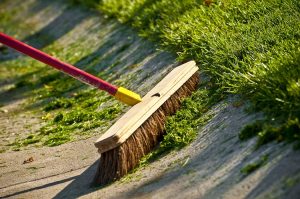Storm drains allow stormwater runoff to flow to local lakes and rivers untreated, taking with it any pollutants, debris, and litter in its path. Stormwater runoff from both urban and rural landscapes create issues for waters in our watershed, particularly Minnehaha Creek, meaning everyone can make a difference in keeping these important natural resources clean.
Here are 5 tips that you and your neighbors can commit to:
1. Adopt a storm drain: While most cities street sweep in the fall and spring, debris flows to storm drains all summer long. By cleaning storm drains regularly, you can stop organic matter (like leaves, pine needles, and tree seeds) and litter from entering lakes and streams. Consider talking with you neighbors and organizing a neighborhood-wide storm drain cleaning to have an even bigger impact!
2. Pick up pet waste: Pet waste harbors harmful bacteria that can be washed off lawns and down storm drains directly to lakes and rivers. Immediately picking up pet waste and disposing of it in the trash means it won’t runoff, and it keeps your yard and your neighbors’ yards looking clean and fresh.
3. Sweep up grass clippings and fertilizer: When you mow your lawn (aim for mowing your grass 3 inches or higher), take a few extra minutes to sweep or blow grass clippings off the street, sidewalk, and driveway back into your lawn. Similarly, if you use lawn fertilizer, be sure to sweep up any extra that may have spilled. Doing so ensures it won’t wash down the storm drain during the next rain.
4. Water your lawn wisely: If we have a dry spell and you decide to water your lawn or garden, try to set your sprinkler or hose to ensure that water isn’t hitting hard surfaces like the street, sidewalk, or driveway. Not only will this keep water soaking into the ground, it’ll save you money on your water bill too!
5. Take your car to the car wash: While washing your car at home may be fun, all that soapy water running down the driveway drains directly to our local lakes and rivers. Water used at established car washes gets treated before it enters lakes and rivers so our waters stay healthier.
Thanks to the Minnehaha Creek Watershed District for this information.



